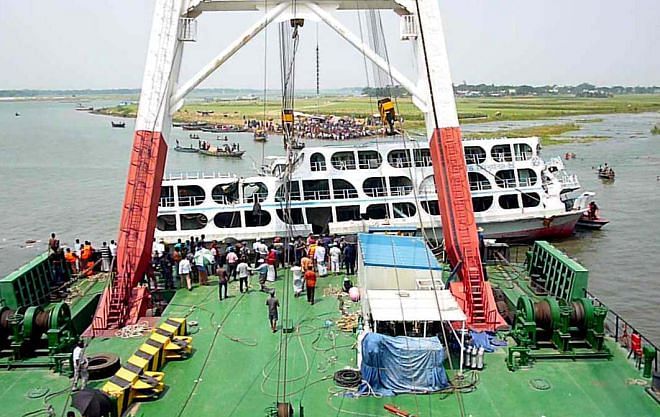Launch accident: A recurring tragedy
Launch accident: A recurring tragedy

PASSENGER launch accidents in our inland waterways are becoming a recurrent phenomenon. The latest of these mishaps occurred only a few days ago, in which 54 invaluable lives were lost, when Shariatpur-bound launch 'MV Miraj-4,' carrying over 200 passengers, sank near Gazaria in the Meghna river after it was caught in a violent storm. Sadly, as days go by, the news of such tragic accidents fade away from our memory. In most countries that are blessed with natural inland waterways network, this mode of transport is considered as safe, low cost, fuel efficient and environmentally friendly. Unfortunately in Bangladesh, the safety issue in the context of inland waterways transport, particularly of passenger launches, has been overlooked for a long time.
A safe passenger vessel is the most important element in preventing frequent accidents in our inland waterways. A flawless design based on stringent rules and regulations is the backbone of a safe vessel that must be constructed according to the design. The Department of Shipping (DOS) is responsible for inland water safety and the approval of designs and plans of inland ships. The ideal practice is constructing the ship under the supervision of an enlisted panel supervisor, after receiving the approval of design and plan from DOS. However, in reality, there is a tendency among ship owners to go for design and plan approval after the construction of the vessel. In many cases, these vessels are not built properly under the supervision of a panel supervisor. As a result, there is inconsistency between the actual launch and its approved design.
In order to avoid the design fee and the supervision fee, the launch owners put their own water crafts as well as the lives of thousands of innocent passengers in jeopardy. In many instances, the launch owners simply ignore or disregard the safety of the passenger vessel by making illegal and dangerous modifications like changing the length or breadth or height without any prior consultation with a qualified naval architect. Checking the design and plan of an inland vessel is a very special type of job and only a person from naval architecture background is entitled to do this type of special task. Unfortunately, most of the personnel engaged in the design checking process are not naval architects. Consequently, flawless design of inland passenger vessels can never be achieved if this practice continues.
Besides, design checking is usually a time consuming job that also requires supporting software and infrastructures. Therefore, due to lack of qualified personnel and software facilities, it is practically impossible to properly identify or detect the flaws of the submitted designs and plans at DOS. To ensure bug-free design, particularly for passenger vessels, DOS can take assistance from experts, whose suggestions and recommendations can be a great help to guarantee the design of safe passenger launches.
At present, there are only four ship surveyors to survey as many as 10,000 vessels plying in the country. It is thus evident that proper survey is physically impossible with such a small number of surveyors. So, the government has no other choice but to increase the number of ship surveyors and inspectors immediately to deal with the huge number of inland vessels. Moreover, to give special emphasis on the safety of passenger vessels, the government needs to appoint special ship surveyors for passenger launches.
Overloading of passenger vessels is a regular feature, particularly during festival times. Due to absence of prior ticketing system the actual number of passengers onboard is unknown, which allows overloading more easily. Sometimes the authorities issue notices to faulty vessels for stopping operation until made the vessel is made fit. The launch owners succeed in operating their unfit launches in collusion with officials of BIWTA and DOS, ignoring the Inland Shipping Ordinance (ISO) 1976. The most alarming thing is the scarcity of trained, skilled and competent crews for the safe operation of the vessels. Deck Personnel Training Centre (DPTC) has been unable to provide sufficient number of trained deck personnel to meet the current demand. As a result, the ship owners rely on unskilled and untrained crews.
A well-equipped ship model testing centre (towing tank) is a must to assess the reliability of the designs of existing passenger launches. It will also help test modified designs as well as innovative designs (like multi-hull ships) for our inland passenger vessels. Unfortunately, Naval Architecture and Marine Engineering Department of Buet, which is more than four decades old, still lacks a towing tank facility. The university has long been trying to set up such a vital ship model testing centre but the till today that has not happened due to lack of understanding of the importance of the centre to the related ministry.
Almost immediately after every launch accident, the government forms probe bodies to investigate the mishap, and they are usually given a short span of time to submit their reports. However, due to non-inclusion of experts from reputed institutions, most of these stereotype reports do not address the actual cause and at the same time fail to point out the real culprits behind these disasters.
In recent years, our local shipyards have succeeded in building large ocean-going ships for foreign countries maintaining stringent international standards. Conversely, many of our inland passenger vessels are built poorly, not even maintaining the local safety standards, which needs to be put to an end. Modernisation of Inland Shipping Ordinance, strict implementation of rules, increase in the number of skilled and trained manpower, and close contact of DOS, BIWTA and BIWTC with marine experts will definitely improve the safety issue for our inland passenger vessels, and will help Bangladesh become a potential shipbuilding nation in future.
The writer is Professor, Department of Naval Architecture and Marine Engineering, Bangladesh University of Engineering and Technology (BUET).
E-mail: mtarequeali@name.buet.ac.bd